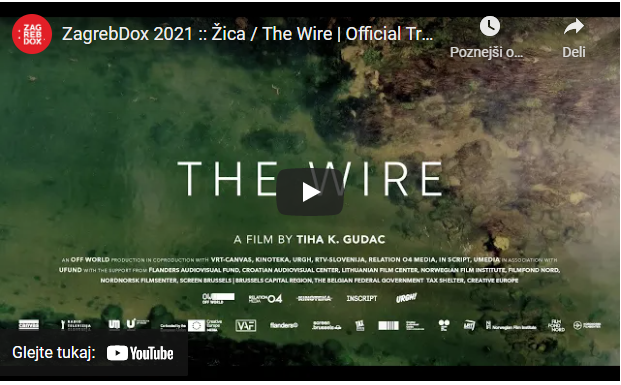V Zagrebu se je v nedeljo 20. 6. 2021 s podelitvijo nagrad zaključil 17. mednarodni festival dokumentarnega filma Zagrebdox, na katerem so v 12 festivalskih programih prikazali več kot 80 filmov. Nagrado mednarodnega združenja kritikov Fipresci si je prislužil hrvaški dokumentarec Žica avtorke Tihe K. Gudac, ki govori o posledicah postavljanja slovenske žičnate ograje ob reki Kolpi na meji s Hrvaško.
Snemanje dokumentarnega filma Žica je poleti 2019 potekalo v Metliki in njeni okolici, na Preloki ter v Poljanski dolini ob Kolpi, v njem pa nastopajo številni Belokranjci. Film se osredotoča na lokalno skupnost na slovenski in hrvaški strani Kolpe ter beleži, kako so se življenja prebivalcev spremenila po letu 2015, ko je bila med eno in drugo državo po odprtju t.i. balkanske migrantske poti nameščena rezilna žica. Režiserka pa v filmu ponudi tudi pogled tistih, zaradi katerih je bila žica postavljena – beguncev na poti. »Z intimnim pogledom na človeška življenja ob lepi, a kontroverzni meji, ta film skozi lokalno perspektivo obravnava zapletena in zahtevna vprašanja globalne begunske krize,« so zapisali v obrazložitvi nagrade.
Film je sicer del večjega projekta “Meje” belgijskega producenta Frederica Nicolaija, ki je združil šest evropskih režiserjev in jim dal nalogo, da ustvarjajo zgodbe o svojih mejah. Rezultat projekta bo šest krajših epizod televizijske serije o mejah, ki bodo predvajane na evropskih TV postajah. Nekatere od teh epizod so se bolj razvile in postale neodvisni filmi.
Film si lahko ogledate na tej povezavi.
Povzeto po: www.radio-odeon.com
The 17th Zagrebdox International Documentary Film Festival ended in Zagreb on Sunday, 20 June 2021, with the awarding of more than 80 films in 12 festival programs. The award of the International Association of Critics Fipresci was won by the Croatian documentary Žica (wire) by Tiha K. Gudac, which talks about the consequences of setting up a Slovenian wire fence along the Kolpa River on the border with Croatia.
The filming of the documentary Žica took place in the summer of 2019 in Metlika and its surroundings, in Preloka and in the Poljanska valley along the Kolpa, and it features many people from Bela krajina. The film focuses on the local community on the Slovenian and Croatian side of the Kolpa and records how the lives of the inhabitants changed after 2015, when it was between one country and another after the opening of the so-called Balkan migrant routes installed cutting wire. In the film, the director also offers a look at those for whom the wire was laid – refugees on the way. “With an intimate look at human lives along a beautiful but controversial border, this film addresses the complex and challenging issues of the global refugee crisis through a local perspective,” the award said in a statement.
The film is part of a larger project “Borders” by Belgian producer Frederic Nicolai, which brought together six European directors and gave them the task of creating stories about their borders. The result of the project will be six short episodes of a television series on borders, which will be broadcast on European TV stations. Some of these episodes developed more and became independent films.
You can watch the film at this link.
Taken from: www.radio-odeon.com

